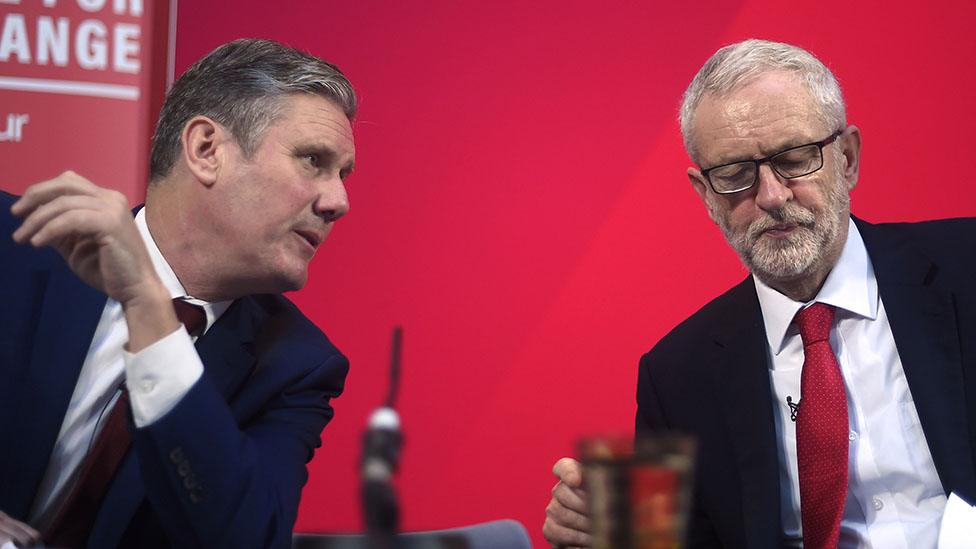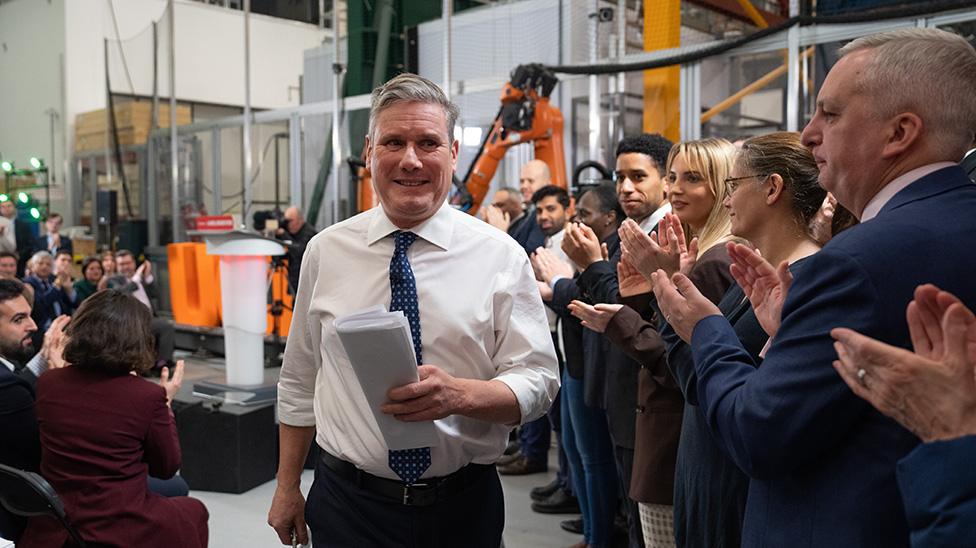Laura Kuenssberg: Is Keir Starmer a prime minister in waiting?
- Published

He is miles ahead in the polls. He faces a rival party with a serious habit of knocking lumps out of itself. Wages run out more quickly every week. And there's a sense among the public that nothing works any more.
Put all that together, and then ask yourself, is Keir Starmer going to be the next prime minister? It's a slam-dunk, surely? Hold on - whether that prospect thrills you, appals you, or leaves you cold, don't make that assumption.
"No-one believes we are really 20 points ahead," says one shadow minister.
The simple gap polls suggest between the two big parties doesn't capture the many voters who aren't sure who to back - showing up right now as a sizeable and mysterious chunk of "don't knows".
The election might be only 18 months or so away, but political years are like dog years, so it's a metaphorical lifetime until 2024.

In the second leader interview of the year, Keir Starmer is on Sunday with Laura Kuenssberg
The programme will also hear from Transport Secretary Mark Harper
Also on the show are the actor Brian Cox, Chair of NatWest Sir Howard Davies and Conservative Chair of the Women and Equalities Select Committee, Caroline Nokes
Follow live updates, with analysis and reaction here on the BBC News website from 08:00
Watch live on BBC One and iPlayer from 09:00

And while the Tories' specialist subject in the last few years has been messy turmoil, their campaign machine will crank up before too long, determined to do Labour a lot of damage.
Remember too, the arithmetic of the existing Parliament. Boris Johnson's win in 2019 was so huge that Labour would have to achieve one of the biggest swings in living memory to end up with a measly majority of one.
That's why one shadow cabinet member says Keir Starmer's "overwhelming message in our meetings is: don't be complacent".
Another says, "You won't find anyone sensible who thinks we have sealed the deal."
It is far, far too early to say if the Labour leader will become the next prime minister.
But let's ask, as this crucial year begins, is Labour's advantage a side-effect of total Tory meltdown - or a political achievement that has persuaded voters to a shift which will really last?
Tory meltdown astonishing
"We don't think it's all down to our brilliant genius," one of Labour's top team jokes.
Unless you've been living on Planet Zog, you'll be well aware that the Conservatives have worked pretty hard in recent times to destroy their reputation as being the natural party of government in the UK.
Their former leader got into trouble over whether he was telling the truth and breaking the law under his own roof.
His successor's financial moves more or less crashed the pound, and "trashed their reputation for looking after our cash", says one shadow minister.
Recession is expected. Inflation is historically high, and hurts. And although taxes are at record levels, public services are visibly stretched too thin in many areas, with strikes to boot.
They have a new leader, prime minister number three, who is trying hard to stop the rot.
Yet digest that list for a moment, and it is little surprise that right now, the opposition are on top. As another shadow minister says though, "It is not good enough just to say we're not the other guys".
Just as the Tories have chaotically been going about the business of eroding their credibility, Keir Starmer has, piece by piece, been deadly serious about rebuilding Labour's.
Just as it's worth remembering how huge the Conservative victory was in 2019, remember too how broken the Labour party was then.
That's not just about the car crash at the ballot boxes, but the fear and loathing inside the party, administrative problems, conflicts over antisemitism, financial issues.
Three years on, Starmer's backers point to a party that's been totally transformed. His moves have angered many on the left who feel that he misled them during his leadership campaign by ditching several of the promises he made then.
Legal disputes and resentments simmer, but there's no question it is a different party, a more focused and efficient machine with a different character and far less internal strife.
Some who were devotees of Jeremy Corybn have left in fury. One shadow minister told me "at party conference there were plenty of people shouting at us on the way in, but at least they're no longer inside the hall".

There's a familiar criticism of Keir Starmer that he's a bit, well, dull - or cautious, to be more diplomatic.
But the change to the party is dramatic.
The shadow minister says while Starmer "didn't do a Blair, make a speech about clause 4 on stage" - when he controversially changed a key clause in Labour's constitution - the change in the party is "profound", and achieved by Starmer's "steeliness" to get it done.
One Labour MP who hung on to their seat in 2019 says that after the changes the leadership has made, the party "isn't something to be frightened of anymore", concluding if Keir Starmer hadn't taken on the battles inside the party, even at their wits' end with the Tories, voters would not have been willing to take a look.
All that, inevitably, feeds into the public's perception of Labour, which shows up so clearly in the polls.
Even in the darkest days of Theresa May, when sometimes it felt like the government might not last the day, Labour under Jeremy Corbyn only edged slightly ahead.
But unsure if this advantage will last, the party's leadership wants to make the most of the moment - using the chance, and a seeming new-found confidence, to talk about immigration, about making changes to the NHS, seeming almost to delight in talking up issues that could cause consternation on the inside, like use of the private sector in health care.
And almost trolling Brexiteers by stealing their "take back control" slogan when talking about the normally worthy subject of devolution.
Politics can (I promise) be fun, and with several months of a polling lead, Keir Starmer looks like he might be beginning to have some.

Labour Party leader Sir Keir Starmer leaves after delivering a New Year's speech at University College London
Yet there are plenty of pitfalls ahead - what position should his party take over the looming constitutional clash over trans rights? How would the Labour party, with its historic ties to the unions, deal with industrial unrest?
There are always calls from the backbenches for him to "get off the sidelines", as one senior MP bemoans, calling for urgency, clarity, a stronger sense of standing up for those suffering in this tough winter.
The same MP reports a "real sense of trepidation and anxiousness" about the Starmer project. "I'm really twitchy about the whole thing."
Another backbencher says that while "voters think we are credible, they don't think we are exciting yet".
While the party is consistently far ahead of the Conservatives, that's not the same as Starmer's personal ratings against Rishi Sunak.
It is impossible to divide up the reason why Labour has been so far ahead for so long neatly into the by-product of the Tory chaos and the changes the party has undergone itself.
One shadow minister wonders if it matters. Yet surely the reasons for the lead will make a difference to how sticky that support is during the battle of the next year - how easy or hard will it be for Keir Starmer to make this poll lead permanent and concrete, or for Rishi Sunak to peel it back?
The Conservatives' implosion has, in the words of one senior Labour figure, "unlocked" the electorate.
Keir Starmer's plan was always a three-stage sequence - to sort out his party, then take the shine off the Conservatives, and then to explain to the country what he would do.
Without question the Tories have done much of the second part of his plan on his behalf. But part three is perhaps just truly beginning.
There is nothing automatic about profiting permanently from your opponents' disaster. And with Rishi Sunak determined to get his party back on track, Keir Starmer can't rely on the Conservatives giving it away.
You can watch from 09:00 GMT on BBC One and iPlayer this Sunday.
